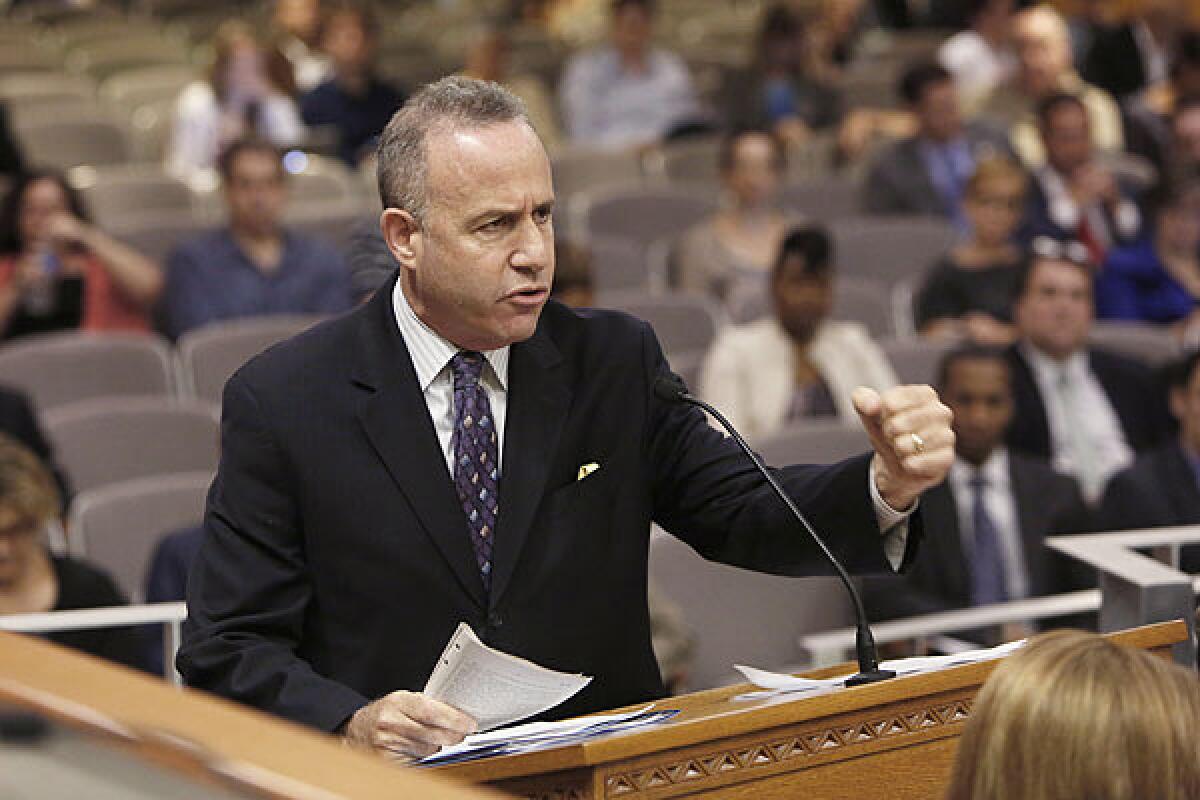Lawmakers to weigh about 400 bills in session’s last week

SACRAMENTO — The fate of tighter gun control measures and restrictions on oil fracking could hang on a mad dash of political maneuvering and deal-cutting in the Legislature this week, when lawmakers have just four days left to act on about 400 bills.
But the thorniest issue may be Gov. Jerry Brown’s $315-million plan for meeting a federal court order to relieve prison crowding, a proposal that has the support of the Assembly speaker but drew criticism from the Senate leader, who offered his own plan instead.
Lawmakers also are expected to decide whether the state should require permits and background checks for people buying ammunition and whether California should outlaw the sale of rifles with detachable magazines. The two proposals were among a raft of gun control bills filed after the massacre at Sandy Hook Elementary School in Connecticut.
The Legislature adjourns for the year Friday, but because the Jewish holiday Yom Kippur begins that evening, lawmakers have agreed to wind up their votes Thursday night.
“We need to get about 100 bills done a day on average,” Senate leader Darrell Steinberg (D-Sacramento) told his colleagues last week.
That doesn’t count the “gut and amend” bills that typically show up in the waning hours of the session. Such measures, which are stripped of their contents and replaced with legislation that may be controversial, often sidestep the normal committee hearing process.
Lawmakers face intense pressure to address prison overcrowding because of a federal court order to reduce inmate numbers by more than 9,600 by the end of the year. Failure to reach a compromise could result in a court’s ordering the early release of some felons.
The governor and Assembly Speaker John A. Pérez (D-Los Angeles) have proposed spending $315 million to place thousands of inmates in county jails and privately owned prisons. Democrats in the Senate prefer to increase spending on rehabilitation, arguing that it is the most effective way to reduce the prison population in the long term, and to try to obtain a three-year extension on the court’s order.
With an election looming in 2014, the stakes are high.
“If you are either a governor or a legislator, letting criminals out of prison and being held in contempt by a federal court are not going to be your two favorite ways to head into your reelection campaign,” said Dan Schnur, director of USC’s Jesse M. Unruh Institute of Politics. “The pressure to come up with a short-term fix is very intense.”
It remains to be seen whether the prison dispute between Steinberg and Pérez, who already had a tense relationship, will affect other issues.
Steinberg’s house has a package of gun control measures awaiting action in the Assembly, including one to require a permit to buy bullets and an expansion of the crimes that disqualify Californians from owning guns.
Also in the Assembly is a Steinberg proposal to streamline environmental laws for housing projects in densely developed neighborhoods.
Other measures awaiting the Legislature’s action involve immigration. A bill by Assemblyman Luis Alejo (D-Watsonville), for example, would expand the number of people in the country illegally who would be eligible to apply for California driver’s licenses.
A measure by Assemblyman Tom Ammiano (D-San Francisco) would bar state and local police from detaining someone on immigration grounds if the person was originally arrested for a minor offense. Brown vetoed a similar proposal last year, saying it would have required law enforcement officials to release dangerous criminals.
This year’s version would let police hold someone for federal immigration officials if that person has been convicted of a felony.
“I’m keeping my fingers crossed,” Ammiano said.
A final push is also under way on a fracking measure by Sen. Fran Pavley (D-Agoura Hills). The bill would establish regulations on controversial hydraulic fracturing, in which water, sand and chemicals are injected underground to release oil and natural gas.
Ammiano intends to revive a bill that would impose statewide regulations on medical marijuana businesses. The proposal faltered in the Assembly in the spring, but Ammiano said he’s been working with Pérez and Steinberg to bring it back to life.
Other bills would:
•Repeal the tax-exempt status of nonprofit groups, including the Boy Scouts, if they do not allow openly gay members.
•Allow misdemeanor rather than felony charges in cases of simple possession of heroin, cocaine and other hard drugs.
•Increase the minimum wage by $2 an hour over five years.
•Require domestic workers, including nannies, to be given benefits, including overtime and rest breaks.
More to Read
Sign up for Essential California
The most important California stories and recommendations in your inbox every morning.
You may occasionally receive promotional content from the Los Angeles Times.











